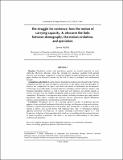| dc.contributor.author | Mallet, James | |
| dc.date.accessioned | 2017-02-13T15:54:48Z | |
| dc.date.issued | 2012 | |
| dc.identifier.citation | Mallet J. 2012. The struggle for existence. How the notion of carrying capacity, K, obscures the links between demography, Darwinian evolution and speciation. Evolutionary Ecology Research 14: 627–665. | en_US |
| dc.identifier.issn | 1522-0613 | en_US |
| dc.identifier.uri | http://nrs.harvard.edu/urn-3:HUL.InstRepos:30212075 | |
| dc.description.abstract | Question: Population ecology and population genetics are treated separately in most textbooks. However, Darwin’s term the ‘struggle for existence’ included both natural selection and ecological competition. Using the simplest possible mathematical models, this paper searches for historical reasons for the lack of unity in ecological and evolutionary thought. Assumptions and methods: Logistic density-dependent population growth and Lotka-Volterra competition models are used throughout. Derivations of the logistic from first principles of resource use, competition for space, and births and deaths of individuals are documented. A full range of possible kinds of natural selection, including constant selection, density- and frequency-dependent selection, as well as hard and soft selection, can emerge cleanly as natural outcomes from the simplest-imaginable haploid models derived from Lotka-Volterra competition. Extensions to incorporate more realism, including non-linear per capita density dependence, Allee effects, complex life histories, discrete generations, diploid Mendelian genetics, sexual populations, and speciation are briefly discussed. Conclusions: Widespread use of r-K (‘carrying capacity’) models of population growth appears to have catalysed fundamental discords in ecology, and between ecology and evolution. Verhulst’s original polynomial form of the logistic, here termed the r-α model, is both more natural in theory, and accords better with empirical data. The r-α formulation explains apparent paradoxes involving the r-K logistic, including controversial aspects of r- and K-selection. Adoption of first-principles birth–death or r-α modelling clarifies natural selection in density-regulated populations, and leads to an improved understanding of Darwinian evolution and speciation. | en_US |
| dc.description.sponsorship | Organismic and Evolutionary Biology | en_US |
| dc.language.iso | en_US | en_US |
| dc.relation.isversionof | http://www.evolutionary-ecology.com/abstracts/v14/2758.html | en_US |
| dc.relation.hasversion | http://mallet.oeb.harvard.edu/files/malletlab/files/mallet_the_struggle_2012.pdf | en_US |
| dash.license | LAA | |
| dc.subject | adaptive dynamics | en_US |
| dc.subject | density-dependent selection | en_US |
| dc.subject | eco-evolutionary dynamics | en_US |
| dc.subject | history of ecology | en_US |
| dc.subject | population genetics | en_US |
| dc.subject | theoretical ecology | en_US |
| dc.title | The struggle for existence. How the notion of carrying capacity, K, obscures the links between demography, Darwinian evolution and speciation | en_US |
| dc.type | Journal Article | en_US |
| dc.description.version | Version of Record | en_US |
| dc.relation.journal | Evolutionary Ecology Research | en_US |
| dash.depositing.author | Mallet, James | |
| dc.date.available | 2017-02-13T15:54:48Z | |
| dash.contributor.affiliated | Mallet, James | |


